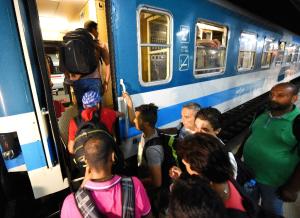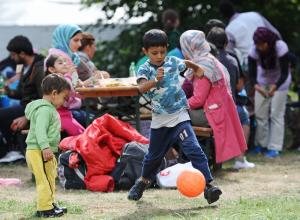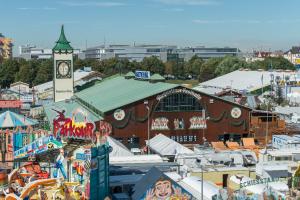Munich faces collision of refugees and Oktoberfest
Munich (Germany) (AFP) - Ursula Stellenberger, a 70-year-old Munich native, has been joining the annual giant Oktoberfest beer party for more than half a century but says this year's edition is unlikely to resemble any other.
The largest influx of refugees seen in decades in Germany has run smack into what Munich calls the world's biggest popular festival, starting Saturday, creating a massive headache for security forces and leaving some locals nervous about an uncomfortable culture clash.
Sipping a lager in a beer garden opposite the sprawling Wiesn grounds of the Oktoberfest, Stellenberger says she is "proud" of her hometown for welcoming war-weary Syrians and Iraqis with an outpouring of donations and hospitality.
"But I wonder where it's going to stop," she said, referring to the nearly 75,000 migrants who have arrived in the region since September 1.
"How many more are coming? Where will they all sleep, who will feed them? We want to help but there are also poor Germans who need help too."
Wearing a light blue satin dirndl, a traditional smock with a low-cut frilly blouse, the retired carpet shop owner voiced concerns that can be heard throughout conservative Bavaria.
After complaints by local authorities that they were overwhelmed by the newcomers, Germany suddenly announced Sunday that it would impose border checks to stem a tide of migrants to Munich, where most taking the so-called Balkan route to Germany arrived first.
The same night, state leader Horst Seehofer let it slip that Oktoberfest -- now in its 182nd year -- had also been on his mind when he pushed for the policy change less than a week before the first keg was to be tapped.
"I asked today for appropriate measures to be taken during the two weeks of Oktoberfest so that Munich does not remain the first port of call that it now is," said Seehofer, a party ally of Chancellor Angela Merkel's who has sparred with her on the refugees issue.
The remarks sparked outrage among many Germans, a majority of whom say they back Merkel's decision to roll out the welcome mat for refugees, and launched the Twitter hashtag #Oktoberfestung (October fortress).
However far-right groups have also taken to social media, drumming up support for an "Anti-Asylum Rally" outside Munich's main railway station hours after Oktoberfest opens.
- 'Very drunk people' -
Oktoberfest is a massive economic and cultural highlight of the year for Munich, drawing six million visitors from around the world during its 16-day run and bringing in roughly one billion euros ($1.1 billion) in revenues.
Since the border checks were introduced, the number of new arrivals at Munich train station has dropped from recent heights of 20,000 people on each of the last two weekends.
But a huge number of people now in Austria are still making their way toward Germany, with more than 9,000 people arriving on Wednesday alone, 2,000 of them by train.
Officials warn that with two million Oktoberfest revellers expected by rail during the festival, transport links could become security flashpoints.
While the event is often convivial in the daytime, drunk guests leaving the Wiesn fairgrounds often leave a trail of vomit at commuter stations, while fistfights and inebriated party-goers falling onto the tracks are not uncommon.
Some 500 police will be on duty at the Oktoberfest venue, where around 400,000 people are expected the first day, and Bavarian officials have asked the federal police for backup.
"Our aim is to keep the various groups of people apart from each other so that conflict situations don't arise," state interior minister Joachim Herrmann said.
"Especially those asylum-seekers from Muslim countries are not used to encountering very drunk people in public."
Last year 6.3 million people attended Oktoberfest and drank 6.5 million litres (1.7 million gallons) of beer, a particularly strong brew made specially for the event.
The Munich government's point man for Oktoberfest, Wilfried Blume-Beyerle, said visitors would be directed to the southern exits of the station toward the nearby Wiesn. Migrants will be shown toward a staging area to the north, behind police barricades, with volunteers offering food, drink and first-aid.
A spokesman for the volunteers, Colin Turner, said he expected most of those people arriving exhausted would have other concerns than a beer party.
"That said, I can imagine that the people who have already been here for a bit and have applied for asylum in Bavaria might be curious what it's all about and will check out the Wiesn," he said.
Turner rejected as overblown calls by some refugee advocates to call off the event in light of the crisis.
"Every year during Oktoberfest there are terrible things happening in the world: wars, people dying -- last year hundreds, even thousands of people drowned in the Mediterranean because of our policies of turning refugees away," he said.
"That is no reason not to still see the beautiful things in life, and to celebrate."





No comments:
Post a Comment